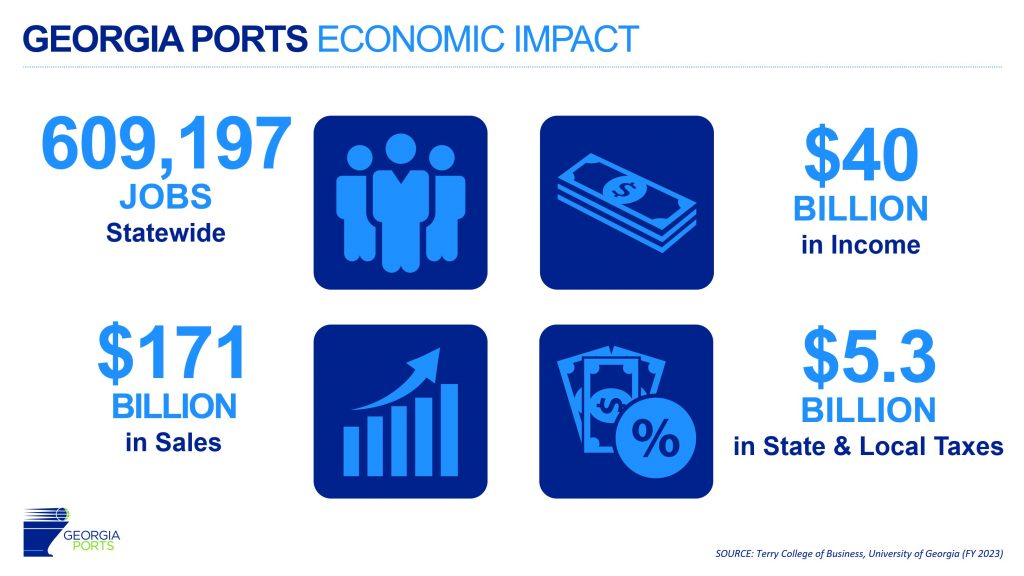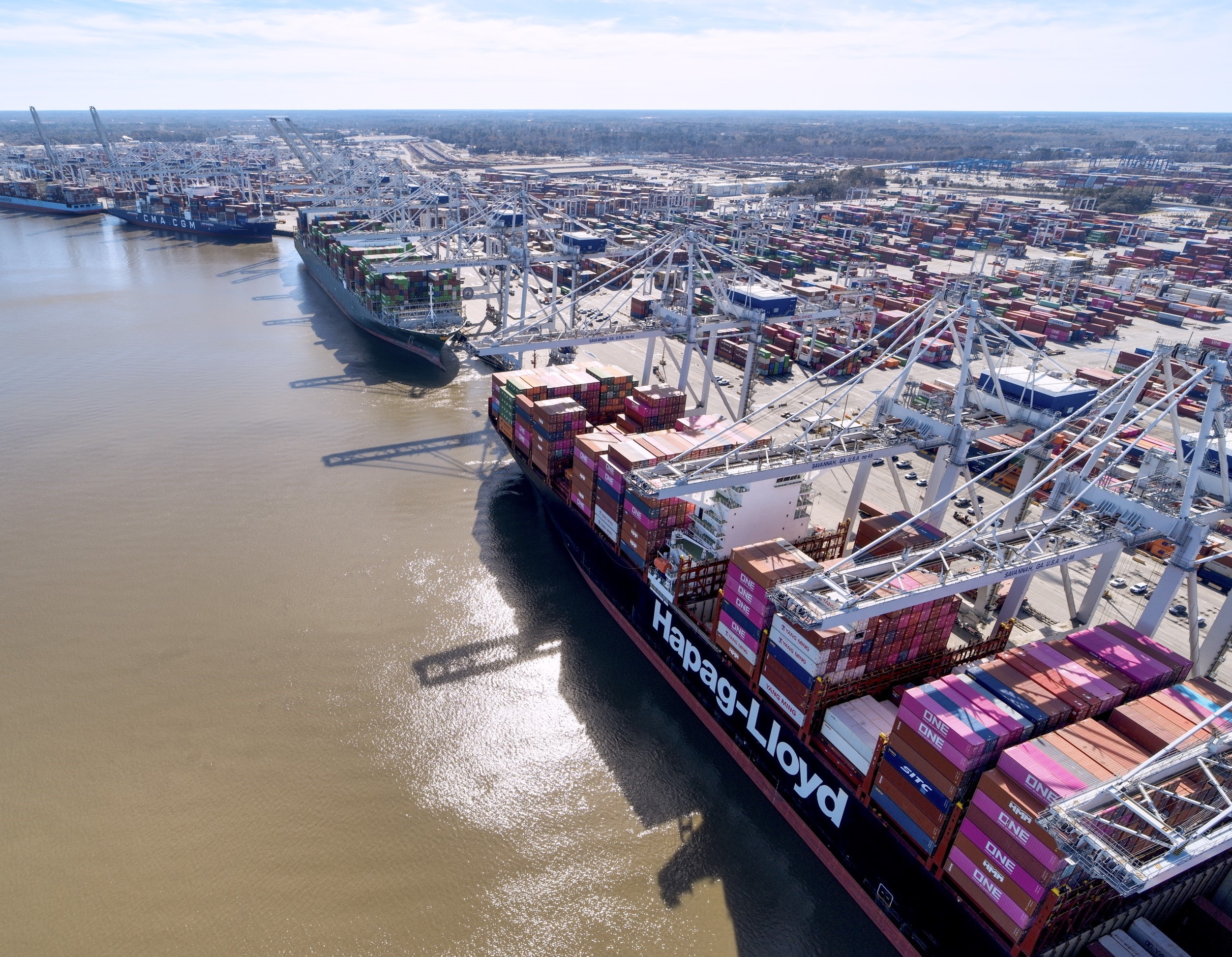SAVANNAH, Ga., March 21, 2025 – Port activity in Georgia now supports approximately 40,200 jobs in Northwest Georgia, and more than 600,000 full- and part-time jobs across the Peach State, according to an economic impact study by the University of Georgia’s Terry College of Business. The statewide number is up 48,000 jobs or 8.6 percent compared to Fiscal Year 2021, the period covered by the previous study.
“This study confirms that our ports are invaluable economic drivers for the entire state,” said Governor Brian Kemp. “Across industries and communities in every corner of Georgia, the Ports of Savannah and Brunswick – as well as our entire ports ecosystem – both directly and indirectly support tens of thousands of jobs and create opportunity all across the state while connecting manufacturers with markets all around the world.”
According to the most recent study, based on Fiscal Year 2023 data, the total number of full- and part-time jobs in the 15 counties of Northwest Georgia that rely on the ports amount to:
- Bartow: 6,617
- Catoosa: 1,901
- Chattooga: 670
- Dade: 595
- Fannin: 645
- Floyd: 4,638
- Gilmer: 879
- Gordon: 3,644
- Haralson: 919
- Murray: 1,893
- Paulding: 3,182
- Pickens: 894
- Polk: 1,384
- Walker: 2,294
- Whitfield: 10,041
Murray County is home to the Appalachian Regional Port, which opened in August 2018. Its mission is to bring port services from the coast to the community, and serve as an economic development magnet, drawing business and industry. It is part of the Georgia Ports Authority’s long-term plan of establishing inland terminals in strategic locations around the state.
Port-supported employment across Northwest Georgia has increased by 18 percent or more than 6,000 jobs since the Fiscal Year 2021 study.
Georgia ports now help sustain 12 percent of total state employment, according to data announced by Georgia Ports Authority President and CEO Griff Lynch at the 2025 Savannah State of the Port event on Tuesday, Feb. 25.
“Georgia’s deepwater ports support 609,197 full- and part-time jobs,” said Jeff Humphreys, director of the Selig Center for Economic Growth, who conducted the study. “This means that almost one job out of every eight is in some way dependent on the ports.”
Other statewide impacts include:
- $171 billion in sales for Georgia businesses (12 percent of state total)
- $72 billion in goods produced or services provided by port-supported industry each year (9 percent of total state GDP)
- $40 billion in income earned by Georgians annually (6 percent of Georgia’s total personal income)
The portion of statewide sales and state gross domestic product related to port trade have both grown by 22 percent compared to FY2021. Personal income earned by Georgians through port-supported business is up by 21 percent over the same period.
“These economic impacts demonstrate that continued emphasis on imports and exports through Georgia’s deepwater ports translates into jobs, higher incomes, greater production of goods and services, and revenue collections for government,” Humphreys reported. “Port operations help to preserve and expand Georgia’s manufacturing base, support Georgia’s agricultural economy, the forestry and mining industries, and the state’s logistics, distribution, and warehousing cluster.”
Internal GPA data show the top three export commodity groups for the study period were food, forest products and automotive cargo. The top imports were machinery, retail goods and furniture.
“As a national gateway for American farm and factory exports, Georgia’s ports link every major ocean carrier calling the U.S. East Coast with superior connections to road and rail,” Lynch said. “Businesses are drawn to GPA’s market by its growing workforce and logistical advantages. These factors, combined with Georgia Ports’ customer-focused service, contribute to job growth across the Peach State.”
Trade through Georgia’s ports also helps to support government services, yielding $10 billion in federal taxes, $2.8 billion in state taxes, and $2.5 billion in local taxes annually.
“The new report shows GPA is fulfilling its mission by positively impacting Georgia, well beyond our gates,” said GPA Board Chairman Kent Fountain. “There are direct benefits in terms of jobs and community opportunities in every county of Georgia.”
The UGA study, “The Economic Impact of Georgia’s Deepwater Ports on Georgia’s Economy in FY 2023” is the latest in a series of similar studies conducted by the Selig Center for Economic Growth. The comprehensive technical report may be viewed here.
Learn more about GPA’s county-by-county economic impact at dev.gaports.com/more-impact

About Georgia Ports
Georgia’s ports and inland terminals support more than 609,000 jobs throughout the state annually, contributing $40 billion in income, $171 billion in revenue and $5.3 billion in state and local taxes to Georgia’s economy. GPA anticipates investing $4.2 billion in the next ten years as part of its port master plan to expand cargo handling capabilities to support future supply chain requirements. As part of GPA’s community engagement efforts, $6 million will be donated to communities located near the Port of Savannah to support a multi-year, local workforce housing initiative. CNBC ranked Georgia #1 in the U.S. for infrastructure in America’s Top States for Business in 2024. Area Development – a site selection news outlet for the U.S., has ranked Georgia as the Top State to Do Business for 11 consecutive years. For further information, visit dev.gaports.com or contact Manager of Media Relations Edward Fulford at [email protected] 912-964-3806.
